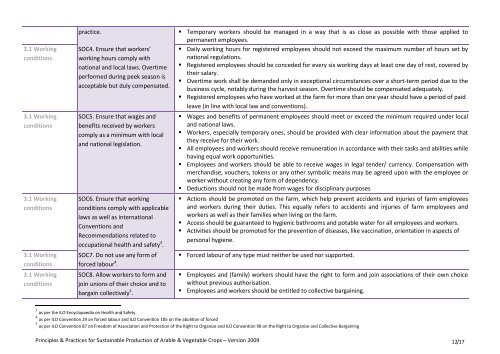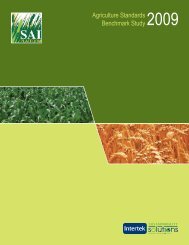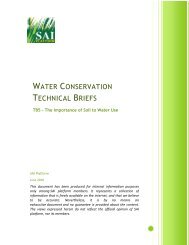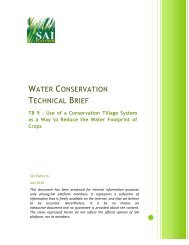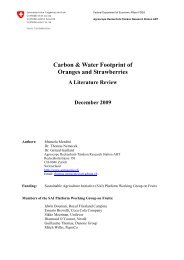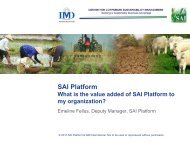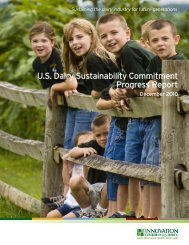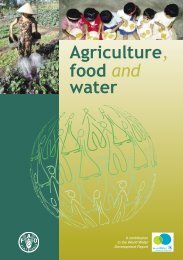Principles & Practices for Sustainable Production of ... - SAI Platform
Principles & Practices for Sustainable Production of ... - SAI Platform
Principles & Practices for Sustainable Production of ... - SAI Platform
Create successful ePaper yourself
Turn your PDF publications into a flip-book with our unique Google optimized e-Paper software.
3.1 Working<br />
conditions<br />
3.1 Working<br />
conditions<br />
3.1 Working<br />
conditions<br />
3.1 Working<br />
conditions<br />
3.1 Working<br />
conditions<br />
practice.<br />
SOC4. Ensure that workers’<br />
working hours comply with<br />
national and local laws. Overtime<br />
per<strong>for</strong>med during peek season is<br />
acceptable but duly compensated.<br />
SOC5. Ensure that wages and<br />
benefits received by workers<br />
comply as a minimum with local<br />
and national legislation.<br />
SOC6. Ensure that working<br />
conditions comply with applicable<br />
laws as well as international<br />
Conventions and<br />
Recommendations related to<br />
occupational health and safety 3 .<br />
SOC7. Do not use any <strong>for</strong>m <strong>of</strong><br />
<strong>for</strong>ced labour 4 .<br />
SOC8. Allow workers to <strong>for</strong>m and<br />
join unions <strong>of</strong> their choice and to<br />
bargain collectively 5 .<br />
• Temporary workers should be managed in a way that is as close as possible with those applied to<br />
permanent employees.<br />
• Daily working hours <strong>for</strong> registered employees should not exceed the maximum number <strong>of</strong> hours set by<br />
national regulations.<br />
• Registered employees should be conceded <strong>for</strong> every six working days at least one day <strong>of</strong> rest, covered by<br />
their salary.<br />
• Overtime work shall be demanded only in exceptional circumstances over a short-term period due to the<br />
business cycle, notably during the harvest season. Overtime should be compensated adequately.<br />
• Registered employees who have worked at the farm <strong>for</strong> more than one year should have a period <strong>of</strong> paid<br />
leave (in line with local law and conventions).<br />
• Wages and benefits <strong>of</strong> permanent employees should meet or exceed the minimum required under local<br />
and national laws.<br />
• Workers, especially temporary ones, should be provided with clear in<strong>for</strong>mation about the payment that<br />
they receive <strong>for</strong> their work.<br />
• All employees and workers should receive remuneration in accordance with their tasks and abilities while<br />
having equal work opportunities.<br />
• Employees and workers should be able to receive wages in legal tender/ currency. Compensation with<br />
merchandise, vouchers, tokens or any other symbolic means may be agreed upon with the employee or<br />
worker without creating any <strong>for</strong>m <strong>of</strong> dependency.<br />
• Deductions should not be made from wages <strong>for</strong> disciplinary purposes<br />
• Actions should be promoted on the farm, which help prevent accidents and injuries <strong>of</strong> farm employees<br />
and workers during their duties. This equally refers to accidents and injuries <strong>of</strong> farm employees and<br />
workers as well as their families when living on the farm.<br />
• Access should be guaranteed to hygienic bathrooms and potable water <strong>for</strong> all employees and workers.<br />
• Activities should be promoted <strong>for</strong> the prevention <strong>of</strong> diseases, like vaccination, orientation in aspects <strong>of</strong><br />
personal hygiene.<br />
• Forced labour <strong>of</strong> any type must neither be used nor supported.<br />
• Employees and (family) workers should have the right to <strong>for</strong>m and join associations <strong>of</strong> their own choice<br />
without previous authorisation.<br />
• Employees and workers should be entitled to collective bargaining.<br />
3 as per the ILO Encyclopaedia on Health and Safety<br />
4 as per ILO Convention 29 on <strong>for</strong>ced labour and ILO Convention 105 on the abolition <strong>of</strong> <strong>for</strong>ced<br />
5 as per ILO Convention 87 on Freedom <strong>of</strong> Association and Protection <strong>of</strong> the Right to Organize and ILO Convention 98 on the Right to Organize and Collective Bargaining<br />
<strong>Principles</strong> & <strong>Practices</strong> <strong>for</strong> <strong>Sustainable</strong> <strong>Production</strong> <strong>of</strong> Arable & Vegetable Crops – Version 2009 12/17


